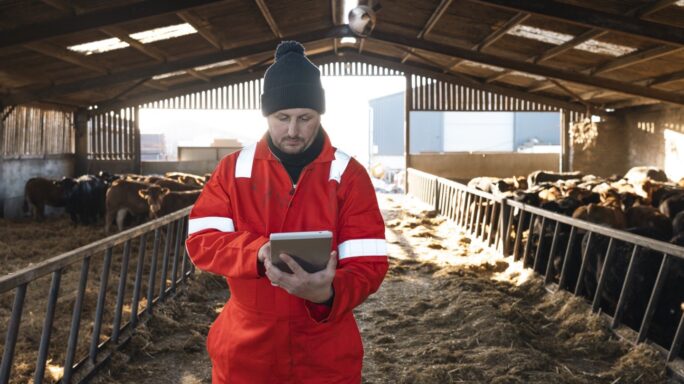MTD for Income Tax: What landlords need to know about Making Tax Digital
Making Tax Digital for Income Tax will affect landlords when it starts in April 2024. Discover what you need to know now so you're ready.

Making Tax Digital for Income Tax is part of the UK government’s long-running plans to digitalise tax.
Doing so makes life easier for individuals and businesses who, because their records are digital, get improved visibility into their finances. This empowers better decision-making and the ability to spot problems before they arise.
Known as MTD, the Making Tax Digital programme has already required VAT-registered businesses over the VAT threshold to use software for their VAT accounting as of April 2019.
All VAT businesses have to follow those rules from April 2022.
As of April 2024, many of individuals currently using Self Assessment will be required to switch to using MTD for Income Tax for their income tax accounting and reporting.
This includes landlords, but only those whose income from their property or properties (e.g. rent) exceeds £10,000 per year.
However, MTD for Income Tax (full title: Making Tax Digital for Income Tax Self Assessment, or MTD for ITSA) also affects sole traders.
If a landlord is a sole trader too, then the income from the sole trader business(es) they own, plus the income from properties, is added together for the purpose of determining if that individual is mandated for MTD for Income Tax. See “How do landlords work out their income for Making Tax Digital for Income Tax?” below.
Note that in this blog we focus solely on landlords, or landlords who also have sole trader income. If you’re a sole trader without any property then please see our existing blog.
Here’s what we cover in this article for landlords:
What do landlords need to do for MTD for Income Tax?
How do landlords work out their income for Making Tax Digital for Income Tax?
What information do landlords need to send as part of MTD for Income Tax?
How do landlords sign up to MTD for Income Tax?
Should landlords join the MTD for Income Tax pilot?
I’m a buy-to-let landlord. Does MTD for Income Tax affect me?
Are furnished holiday lettings (FHLs) included in MTD for Income Tax?
Is rental income from foreign (non-UK) property I own included in MTD for Income Tax?
Does MTD for Income Tax apply to rental income from flats/apartments?
If I sell/dispose of a property, does the income count towards MTD for Income Tax?
I’m already registered for MTD for VAT. Do I need to register for and/or use MTD for Income Tax?
Does the £10,000 MTD for Income Tax threshold apply to each property?
Is it just rental income from property that’s considered for MTD for Income Tax?
Can I leave it to my accountant to handle MTD for Income Tax for my properties?
How to get started with MTD for Income Tax if you’re a landlord
Final thoughts on MTD for Income Tax for landlords
A guide to Making Tax Digital for Income Tax
Need help to get your business ready for Making Tax Digital? Download this free guide to learn about MTD for Income Tax and get prepared now.

What do landlords need to do for MTD for Income Tax?
For those within its scope, the rules of MTD for Income Tax are as follows:
- Software compatible with MTD for Income Tax must be used for your accounting relating to income tax. Your accounting records relating to income tax must be held digitally (e.g. invoice and expenses data), and kept for the required period after the tax year ends (currently five years). Note that you may need to activate the MTD for Income Tax functionality in your software – speak to your software vendor ahead of time.
- You or your accountant must register you for MTD for Income Tax before 6 April 2024. If you’re already registered for Self Assessment, or have already registered for MTD for VAT, you will not be transferred across automatically when MTD for Income Tax begins.
- You’ll no longer need to send a Self Assessment return for income tax (although one might still be needed in some cases in order to report other kinds of income outside the scope of MTD for Income Tax. This will be submitted in addition to fulfilling your requirements that arise from MTD for Income Tax).
- You must provide HMRC with quarterly updates using software. You can send more than quarterly updates if it helps your situation. There’s no legal requirement for the updates to be accurate, but doing so will help you see your predicted tax and National Insurance liability.
- By 31 January following the end of the tax year, you must use software to provide HMRC with an end of period statement (EOPS). This will detail your property income and allowable expenses. If you own a sole trader business (or businesses) then you’ll also need to submit an EOPS for each. These should follow the end of the accounting period for that business, but be submitted by 31 January at the latest.
- By 31 January following the end of the tax year, you must use software to provide HMRC with a final declaration of all your income. If you have any income from a sole trader business then this will need to be included too.
- By 31 January, you’ll need to pay the balance of any tax and National Insurance contributions due. Note that the payment on account system will continue, so you may need to make a further payment on 31 July of the same year.
How do landlords work out their income for Making Tax Digital for Income Tax?
If you’re not a sole trader, all you need do is calculate the rental income you receive from the one or more of the properties you own (or own a share of).
Is the total rental income you receive more than £10,000 per annum? If so, you need to register for and then use MTD for Income Tax for your accounting relating to your property rentals.
If you’re a sole trader who uses Self Assessment for other businesses unrelated to being a landlord, it’s a little more complicated.
To work out your income for the purposes of Making Tax Digital for Income Tax, the rental income should be combined with income from any sole trader businesses you own.
If the total comes to more than £10,000, you need to register for and then use MTD for Income Tax for accounting relating to income from your property rental, as well as from your business(es).
Here’s some examples:
- Individual A has a property that brings in rental income of £12,000 per year. This is above the £10,000 threshold so they will need to use MTD for Income Tax for the accounting relating to their property. Additionally, if they carry on employment as a sole trader – either now or in the future – they’ll need to use MTD for Income Tax for the accounting relating to this too.
- Individual B inherited a property that is rented for £9,000 a year. They have full-time employment and pay tax and National Insurance through their employer’s payroll. Because their income from property is below £10,000, they do not need to use MTD for Income Tax. Instead, they should continue using the Self Assessment system.
- Individual C is a buy-to-let landlord with a property that’s brings in £8,000 income through rents each year. They work as a sole trader, with an income of £9,000. The aggregate income is £17,000, which is above the £10,000 threshold. They are required to use MTD for Income Tax.
What information do landlords need to send as part of MTD for Income Tax?
There’s no real change to the kind of information you’ll need to provide compared to completing a Self Assessment tax return.
For example, you’ll still need to declare your income, and where it came from. You’ll still need to declare your allowable expenses.
The difference is that you’ll need to provide this information to HMRC more frequently (at least quarterly), and you’ll need to do so through software.
How do landlords sign up to MTD for Income Tax?
Although you might be able to join the MTD for Income Tax pilot, you can’t currently sign up to the full MTD for Income Tax scheme.
It’s anticipated HMRC will open the portal to sign up to MTD for Income Tax closer to the 6 April 2024 mandation date. We’ll update this blog when we know more.
Should landlords join the MTD for Income Tax pilot?
There are currently limitations with the pilot.
At the moment it’s limited to landlords, or those who have a single sole trader income (or those who have both UK property rental income and a single sole trader income). Additionally, software support is limited to just a handful of vendors.
These restrictions will be lifted as time goes on and the pilot opens to more people.
However, signing up to MTD for Income Tax ahead of time via the pilot scheme certainly makes sense once it’s right for you.
You’ll get a chance to get to grips with the requirements and any new software as required, and make use of HMRC’s support services before they become overwhelmed because millions of people are signing up.
If you use an accountant, you should speak to them ahead of signing up for MTD for Income Tax, because they might need to update their systems too.
I don’t run a business. I simply receive rental income from a single inherited property. Does MTD for Income Tax apply for me?
Yes, if your annual rental income is above £10,000.
If you rent out property then HMRC considers you to be running a business. It doesn’t matter if you’re employed full time doing something else and already pay taxes that way.
Your work as a landlord might be part time, or even something that demands hardly any of your time, but the income must still be declared.
I receive income from shares in a real estate investment trust (REIT). Does MTD for Income Tax affect me?
No. As of MTD for Income Tax’s launch in 2024, only rental income from property ownership will be considered to be within scope.
I’m a buy-to-let landlord. Does MTD for Income Tax affect me?
If your rental income you receive personally is more than £10,000 (or is above £10,000 when combined with sole trader income) then MTD for Income Tax applies.
If you own a buy-to-let property with your spouse or another family member, see “I own a share of a property, and receive a share of the rental income. Does MTD for Income Tax apply?” below.
The above assumes you own all or part of the property personally.
If your buy-to-let properties are owned by a limited company you set up for the purpose, then MTD for Income Tax will not apply – see “My properties are owned by an incorporated company, from which I pay myself a salary and/or dividend. Does MTD for Income Tax apply?” below.
Are furnished holiday lettings (FHLs) included in MTD for Income Tax?
Yes, if your rental income is above £10,000 (as mentioned above, if you’re a sole trader then income from your business also contributes to this threshold).
The same special rules will continue to apply to FHLs with regard to claiming reliefs and allowances, and occupancy conditions.
Is rental income from foreign (non-UK) property I own included in MTD for Income Tax?
Yes, if your rental income is above £10,000 (as mentioned above, if you’re a sole trader then income from your business also contributes to this threshold).
As with the existing Self Assessment scheme, you may be able to claim double tax relief if the income is also taxed in the country where your property is.
Does MTD for Income Tax apply to rental income from flats/apartments?
It the rental income is over £10,000 (or is above £10,000 when combined with sole trader income) then MTD for Income Tax applies.
No distinction is made for the type of property.
Whether the property is furnished or unfurnished has no bearing on MTD for Income Tax either. It’s solely about the rental income an individual receives and for which income tax is therefore due.
Similarly, income from commercial lets is also within scope of MTD for Income Tax if the threshold is breached and that property is owned by an individual (or more than one person).
If I sell/dispose of a property, does the income count towards MTD for Income Tax?
No. That would typically be classed as a capital gains tax. Speak to an accountant if you’re in any doubt.
I’m already registered for MTD for VAT. Do I need to register for and/or use MTD for Income Tax?
Yes, if your property income is above the £10,000 threshold (either on its own or combined with your income from sole trader businesses you own).
MTD for VAT and MTD for ITSA are independent of each other. They apply to different types of tax.
I own a share of a property, and receive a share of the rental income. Does MTD for Income Tax apply?
You should consider the rental income you personally receive, rather than the total rental income from the property (or properties).
MTD for Income Tax will apply If this income is above the £10,000 threshold (either on its own or combined with your income from sole trader businesses you own).
Does the £10,000 MTD for Income Tax threshold apply to each property?
There are no thresholds applied to property for Making Tax Digital for Income Tax.
The £10,000 income threshold applies to your personal income for which income tax might be deducted – whether that’s from rental income, or income from any sole trader business(es) you own.
Is it just rental income from property that’s considered for MTD for Income Tax?
If you keep any tenancy deposit for repairs then, as currently, this will be considered income and then whatever you spend on the repair could be considered an allowable expense.
As for other types of regular income from a property, it’s not yet clear. There might cases where ongoing royalties on mineral rights are received, for example.
These might need to be included alongside rental income, but we’ll have to consult the wording of the MTD for Income Tax legislation to be sure.
My properties are owned by an incorporated company, from which I pay myself a salary and/or dividend. Does MTD for Income Tax apply?
In short, it’s unlikely MTD for Income Tax will apply.
Since the properties are owned by the incorporated company, corporation tax will apply to the rental income.
If you’re employed by the company, and your salary is paid through its payroll, MTD for Income Tax will not apply to your salary.
Dividends from the company should be reported and paid through the usual Self Assessment route, and are not within scope of MTD for Income Tax at the present time.
If any property is disposed of, the income would be considered a chargeable gain for corporation tax purposes.
It’s worth noting that the government is planning a Making Tax Digital scheme for corporation tax. But this will not arrive until 2026, at the earliest.
It will be independent of both MTD for Income Tax, and MTD for VAT.
Can I leave it to my accountant to handle MTD for Income Tax for my properties?
Yes and no.
You’ll need to use software for your accounting relating to income tax. That can’t be avoided.
Considering the admin time savings modern cloud accounting software offers, this is something that should be embraced.
However, you can still rely on an accountant to work out your quarterly updates, EOPS and final declaration each year.
An accountant will still be able to help you make any necessary adjustments and reliefs.
I’m new to being a landlord, having only just purchased or inherited a property. When will MTD for Income Tax apply to me in April 2024?
In theory, if your property income is over £10,000 then MTD for Income Tax applies (with the sole trader proviso, as above).
However, the threshold will probably be calculated based on the previous period’s Self Assessment tax return.
Therefore, it’s likely that those who are new landlords will first have to register for Self Assessment and complete a first tax return.
At that point, it may become clear the £10,000 threshold has been passed, so they will then switch to using MTD for Income Tax.
As with several details relating to MTD for Income Tax, we await clarity on this point from HMRC.
If I have to keep a tenancy deposit to pay for repairs, is it included in my MTD for Income Tax calculations?
Yes.
It will be considered income and then whatever you spend on the repair could be considered an allowable expense.
If in doubt, consult an accountant.
How to get started with MTD for Income Tax if you’re a landlord
If you’re a landlord, Making Tax Digital might sound daunting. But it doesn’t have to be the case.
Here are the steps involved.
- You’ll need to sign up ahead of time: The start date for those accounting for income for property through MTD for Income Tax is 6 April 2024. This is known as the digital start date and rental income received after this date must be accounted for using MTD for Income Tax. Note that if you’re also using MTD for Income Tax for sole trader income then the digital start date for accounting for that will probably match your accounting period – so may start later for your sole trader business.
- Consider joining the pilot scheme: This lets you sign up for MTD for Income Tax earlier than the mandated digital start date. However, you can only join if your income is from UK properties (that is, not overseas). Your Self Assessment returns and payments must be up to date, and software support for MTD for Income Tax is also limited to only a handful of vendors right now. Additionally, if you also have a sole trader business, you can’t join if you have multiple (more than one) trader businesses.
- Update to accounting software that’s ready for MTD for Income Tax: You must use software for your accounting relating to income tax, and it must be compatible with MTD for Income Tax. You should ensure any software you use is updated in time. You might find that some older accounting packages simply won’t be updated. Cloud accounting software will almost certainly be updated well in time, but you should consult your software vendor.
- Here’s the initial two-year timeline of requirements for landlords using MTD for Income Tax: April 2024 until April 2026. This is a minimum list of requirements. You can make more than quarterly updates, for example, if that suits your admin processes. Remember also that you may need to make additional updates/EOPS, not listed below, if you also have any sole trader businesses:
- Before April 2024: Sign up for MTD for Income Tax (assuming you haven’t already signed up to the pilot scheme). Potentially upgrade your accounting to MTD for Income Tax-compatible software and inform your accountant.
- 5 August 2024: The last date by which the first quarterly update for 2024/25 must be submitted using software (assuming an earlier update hasn’t been made).
- 5 November 2024: The last date by which the second quarterly update for 2024/25 must be submitted using software (assuming an earlier update hasn’t been made).
- 31 January 2025: Any Self Assessment tax return for 2023/24 is due (that is, for the period before MTD for Income Tax began). If you’ve signed up for the MTD for Income Tax pilot scheme ahead of time, you won’t need to submit this final return.
- 5 February 2025: The last date by which the third quarterly update for 2024/25 must be submitted using software (assuming an earlier update hasn’t been made).
- 5 May 2025: The last date by which the fourth quarterly update for 2024/25 must be submitted using software (assuming an earlier update hasn’t been made).
- 5 August 2025: The last date by which the first quarterly update for 2025/26 must be submitted using software (assuming an earlier update hasn’t been made).
- 5 November 2025: The last date by which the second quarterly update for 2025/26 must be submitted using software (assuming an earlier update hasn’t been made).
- 31 January 2026: The last date by which the end of period statement must be submitted. The EOPS can theoretically be filed at any point after 6 May 2025.
- 31 January 2026: You must make a final and accurate declaration relating to your income. This can include an adjustments or reliefs, as necessary. This must include any sole trader income too.
- 5 February 2026: Third quarterly update for 2025/26 must be submitted using software (assuming an earlier update hasn’t been made).
Final thoughts on MTD for Income Tax for landlords
MTD for Income Tax is a landslide change for landlords and sole traders. It impacts millions of individuals, some of whom may not even realise they’re running a business and that MTD for Income Tax therefore applies to them.
Because accounting relating to property income can be simply a matter of logging rents alongside any money spent on the property, many landlords may still be using written record-keeping, or a spreadsheet.
The legally enforced requirement to use software may come as a surprise.
Spreadsheets can be used for MTD for Income Tax accounting but are unlikely to be a user-friendly option considering the need to submit regular updates and reports (they can be used elsewhere within your accounting, as required, of course).
Preparation work for MTD for Income Tax should begin sooner rather than later.
April 2024 might seem some distance away, but it will be here before we know it. Diving head first into MTD for Income Tax when you have no choice is unlikely to be a pleasant experience.
Starting now with your preparations, and getting up to speed ahead of time, will bring the best results for you and your businesses.
Editor’s note: MTD for Income Tax has been postponed until April 2024. This article (first published in July 2021) has been updated to reflect that.
A guide to Making Tax Digital for Income Tax
Need help to get your business ready for Making Tax Digital? Download this free guide to learn about MTD for Income Tax and get prepared now.







Hi, Just read your article, could you give me a link to sage software for a landlord that I could use.
Cheers
Jason
Hi Jason,
Sure, Sage Accounting will be ideal for your needs. Here’s more details for you: https://www.sage.com/en-gb/sage-business-cloud/accounting/industry/property/
Thanks, Stacey